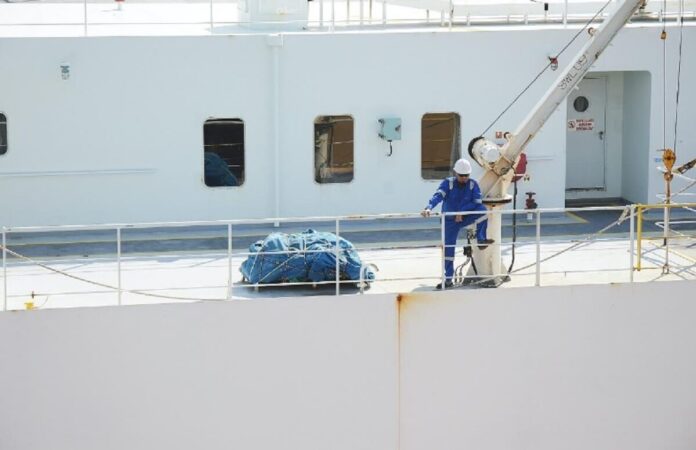Offshore operations involve considerable risks that can jeopardise the safety of workers and the environment. The oil and gas industry is known for its hazardous working conditions, where a small mistake can lead to catastrophic consequences. Therefore, it’s essential to prioritise safety offshore and invest in measures that can mitigate potential risks. At the heart of this endeavour are specialised safety tags that play a crucial role in safeguarding lives.
Compliance with UK offshore standards is a legal requirement that all companies operating offshore must adhere to. The UK offshore industry has set high safety standards, and failure to comply with these standards can result in severe fines and reputational damage. Therefore, offshore companies must invest in safety measures to protect their workers and ensure compliance with UK offshore standards.
Specialised safety tags are one such safety measure that can help prevent accidents, injuries, and loss of life offshore. These tags are designed to meet specific safety standards and regulations and provide clear identification and communication of potential hazards. When used correctly, safety tags can help workers make informed decisions and take appropriate actions to ensure their safety.
Investing in safety measures offshore should be a top priority for every company operating in the offshore environment. Safety tags are just one of the many ways companies can prioritise safety. Training programs, equipment maintenance, and other safety measures all play a part in keeping workers safe and secure. In conclusion, offshore companies must ensure the safety of their workers and the environment by investing in safety measures, including specialised safety tags.
The Significance of Offshore Safety
Offshore operations come with a host of potential risks that can have serious consequences. From accidents to injuries to loss of life, the dangers of working offshore cannot be overstated. This is why it is crucial to prioritize safety at all times.
Read Also: Unearthing Value: Reclaiming Unwanted Insurance Expenses
Proactive safety measures are essential to minimize the risk of accidents and injuries, and to ensure that workers are able to carry out their duties without fear of harm. By investing in safety measures, companies can protect their employees and safeguard their operations.
Understanding Specialised Safety Tags
Specialised safety tags play a crucial role in ensuring safety offshore. These tags are designed to meet specific safety standards and regulations, and they are essential in identifying and communicating potential hazards to prevent accidents and injuries.
The purpose of specialised safety tags is to provide clear and concise warnings, instructions, and identification of potential hazards to offshore workers. These tags are designed to withstand harsh and challenging offshore environments where traditional safety measures may not suffice.
Types of Specialised Safety Tags
- Lockout tags: These tags are used to lockout equipment or machinery to prevent accidental startup, ensuring worker safety during maintenance or repair work.
- Fire extinguisher tags: These tags identify the location of fire extinguishers, ensuring quick access in case of an emergency.
- Inspection tags: These tags are used to mark equipment or machinery that has been inspected, indicating the date and the name of the inspector.
- Warning tags: These tags provide warning messages for potential hazards, ensuring offshore workers are aware of the risks involved.
By using specialised safety tags, offshore workers can make informed decisions and take appropriate actions to ensure their safety. These tags provide vital information and instructions to workers, reducing the risk of accidents and injuries in an offshore environment.
Compliance with UK Offshore Standards
UK offshore standards serve to protect workers and the environment in offshore environments. It is essential for companies operating offshore to comply with these standards to ensure a safe working environment.
The UK Health and Safety Executive (HSE) is responsible for regulating the offshore industry and enforcing compliance with legal requirements. Failure to comply can lead to severe consequences, including fines, imprisonment, and damage to reputation.
Regulations and Safety Requirements
The Offshore Installations (Safety Case) Regulations 2005 require companies to demonstrate that their safety management systems are effective in identifying and controlling risks. Companies must also have an emergency response plan in place to respond to incidents.
The Health and Safety at Work etc. Act 1974 outlines duties of employers to ensure the safety of their employees. This includes providing adequate training, equipment, and supervision to prevent accidents and injuries.
Ensuring Compliance
- Regular monitoring and auditing of safety systems to ensure compliance.
- Providing safety training programs for employees to promote safety awareness and knowledge of procedures.
- Regular maintenance and testing of equipment and systems to prevent failure.
- Continuous improvement of safety management systems to minimize risks and enhance safety performance.
- Investing in specialized safety tags that comply with offshore standards to enhance communication and identification of potential hazards.
Compliance with UK offshore standards is crucial for protecting workers and the environment in offshore environments. Companies must prioritize safety and invest in safety measures, including the use of specialized safety tags, to ensure compliance and safeguard lives.
Investing in Safety Measures
In offshore environments, safety should always be a top priority. Companies must take proactive measures to prevent accidents, injuries, and potential loss of life. Investing in safety measures is key to achieving this goal.
One way companies can prioritize safety offshore is by using specialised safety tags. These tags are designed to meet specific safety standards and regulations, ensuring clear identification and communication of potential hazards. By using these tags, workers are equipped with the knowledge they need to make informed decisions and take appropriate actions to ensure their safety.
Training programs are another important part of investing in safety offshore. Workers should receive regular training to ensure they are equipped with the skills and knowledge they need to identify and respond to potential hazards. Training should be tailored to the specific needs of the offshore environment and should be ongoing to ensure workers are up to date with the latest safety procedures.
Equipment maintenance is also a critical aspect of investing in safety offshore. Regular maintenance and inspections can prevent equipment failure and ensure equipment is functioning properly. Companies should have a comprehensive maintenance program in place to ensure all equipment is regularly checked and repaired, if necessary.
Investing in safety measures is not only crucial for protecting the lives of workers but also for complying with UK offshore standards. Companies that fail to comply with these standards risk serious legal and financial consequences. By prioritizing safety and investing in safety measures, companies can ensure they are operating in a safe and compliant manner, protecting both their workers and the environment.
Safeguarding Lives with Safety Tags
Specialised safety tags play a crucial role in safeguarding lives offshore. These tags are designed to meet specific safety standards and regulations, ensuring clear identification and communication of potential hazards. They provide vital information that enables workers to make informed decisions and take appropriate actions to ensure their safety.
One of the key benefits of safety tags is that they provide clear warnings and instructions. This is essential in offshore environments where workers are exposed to various hazards. By clearly identifying potential hazards, safety tags help workers avoid accidents and injuries, and ultimately, prevent loss of life.
Another benefit of offshore safety tags is that they enable workers to identify and communicate hazards quickly and effectively. This is crucial in emergency situations where time is of the essence. Safety tags provide clear and concise information that can be easily understood, even under extreme pressure.
Furthermore, safety tags promote a proactive safety culture. By providing clear visibility of potential hazards, safety tags encourage workers to take responsibility for their own safety and the safety of others. This helps to create a culture of safety that is essential in high-risk offshore environments.
In summary, safety tags are a vital component of offshore safety. They provide clear warnings and instructions, enable workers to identify and communicate hazards quickly and effectively, and promote a proactive safety culture. As such, investing in specialised safety tags is an essential part of prioritising safety offshore.
Conclusion
Ensuring safety offshore is of paramount importance, and specialised safety tags play a crucial role in achieving this goal. Companies that operate offshore must comply with UK offshore standards and invest in safety measures to safeguard the lives of their workers and protect the environment.
Proactive safety measures are necessary to prevent accidents, injuries, and potential loss of life. This includes the use of specialised safety tags, which help to clearly identify and communicate potential hazards, enabling workers to make informed decisions and take appropriate actions.
Investing in safety measures is not only a legal requirement but also a moral obligation. Companies must prioritize safety offshore and take all necessary steps to protect the lives of their workers. By doing so, they not only comply with regulations but also create a safer and more reliable working environment.
Specialised safety tags may seem like a small investment, but they can make a significant difference in preventing accidents and saving lives. Companies that prioritize safety offshore are more likely to attract and retain skilled workers, build a positive reputation, and achieve long-term success.
FAQ
Q: What is the importance of safety offshore?
A: Safety offshore is crucial to prevent accidents, injuries, and potential loss of life in offshore operations. It ensures the well-being of workers and the protection of the environment.
Q: How do specialised safety tags contribute to offshore safety?
A: Specialised safety tags are designed to meet specific safety standards and regulations. They provide clear identification and communication of potential hazards, enabling workers to make informed decisions and take appropriate actions to ensure their safety.
Q: Why is it important to comply with UK offshore standards?
A: Compliance with UK offshore standards is essential to ensure the safety of workers and the environment. It involves adhering to legal requirements and regulations that regulate offshore operations and minimize risks.
Q: How can companies invest in safety measures offshore?
A: Companies can prioritize safety offshore by investing in various measures, such as using specialised safety tags, implementing training programs, and ensuring equipment maintenance. These actions contribute to creating a safe working environment.
Q: What role do safety tags play in safeguarding lives offshore?
A: Safety tags play a critical role in safeguarding lives offshore by providing clear warnings, instructions, and identification of potential hazards. They enable workers to make informed decisions and take appropriate actions to protect themselves.




